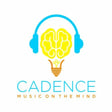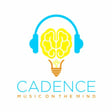Become a Creator today!Start creating today - Share your story with the world!
Start for free
00:00:00
00:00:01

Episode 03: How We Find Meaning in Music
Last episode we met George Shin, who not too long ago received a cochlear implant and started to take piano lessons as part of a study at the University of California in San Francisco. This week we will learn more about his journey, the purpose and results of the study, and we’ll start exploring how people find meaning in music.
Transcript
Introduction and Sponsor Message
00:00:00
Speaker
The creation of this podcast and this episode is generously sponsored by the Germanicos Foundation. Welcome back to Cadence. I'm Andrei Viscontis.
Are there universals in music?
00:00:10
Speaker
Last time on the show, we asked whether there are any universals in music, and we found out that repetition is a key component, possibly making us listen to music differently compared with other sounds, more meditatively, more deeply.
00:00:25
Speaker
finding meaning in sound that goes beyond words. For patients with hearing loss, though, it's difficult enough to navigate speech. Music is often just annoying.
George Shin's Journey with Hearing Loss
00:00:35
Speaker
We met George Shin, who not too long ago received a cochlear implant and started to take piano lessons as part of a study at the University of California in San Francisco.
00:00:45
Speaker
This episode will learn more about his journey, the purpose and preliminary results of the study, and we'll start exploring how we find meaning in music.
00:01:09
Speaker
When I first met George, I asked him when he became aware of his hearing loss, and he couldn't really remember. He suspected that it was related to a fever he had when he was five years old. My main recollection is always having to sit near the front of the class, having to sit in the front of the class.
00:01:28
Speaker
I could never end up in a fourth team. I could never learn the rules because I don't hear the verbal instructions. I'm yelling across the field, whatever. And so I was always picked last fourth team. I was always not having any really close friends.
Social Challenges and High School Experiences
00:01:49
Speaker
I remember things like being chased around the field, people making fun of me.
00:01:53
Speaker
I can only imagine how difficult it must be for a child to navigate school without being able to hear very well, or even knowing necessarily that their hearing is different from everybody else's. Of course, through my whole experience in moving from grade school, where one teacher, one class, you don't move around, to junior high, where you're suddenly in a cafeteria, you're changing class all around, and not everybody follows you around.
00:02:22
Speaker
Also, you're down there, kind of, and then you have a biology teacher. You really couldn't care very well, even though I'm from the room. It was kind of a traumatic summer degree, but in some ways, I was respected because I do well academically. Not really top, but close enough.
00:02:50
Speaker
High school was a particularly difficult time for George. But it's also a time when music plays a major role in our social activities. Think about it. The music that you were exposed to in high school probably still holds a special place in your heart, in your identity, and in your memories.
00:03:08
Speaker
Imagine now not having that. Kids bond over bands. But what if you can't really hear the bands? So I asked George if he remembered listening to any kind of music in high school. I don't know. It's sort of one of those things, you know, I don't really want to remember my junior high, high school years. I mean, flashes of it come back, but I don't live it. I guess it was the Beatles era, I guess.
00:03:37
Speaker
didn't really tie into it. I mean, it's not really part of popular culture to some degree. I always wanted to fit in. George's experience of high school is so very different from mine, given that so many of my memories are tied to the things that I was listening to, the things that were helping me figure out who I am. I asked George if there were any memories that he had that might have been related to music.
00:04:03
Speaker
Somehow I got the nerve to ask someone to go to the senior prom.
Academic Success and Higher Education
00:04:09
Speaker
She ended up being a valetorian, by the way. At the prom, George did much better with the slow dances. In the fast ones, he would kind of just follow what everybody else was doing. But when it came to the slow dances,
00:04:21
Speaker
I guess I'm here to be not terribly out of place. So I might have gone to like one or two dance or music events when it's in that first year. Of course, it's always feeling an outsider because it can't function in there. I mean, I can't talk to anybody. I can't be part of a crowd or whatever. We just watch it.
00:04:54
Speaker
Despite his hearing loss, George thrived academically, graduating with an industrial engineering and operations research degree from Berkeley.
Cochlear Implant Decision and Study Participation
00:05:02
Speaker
His thirst for knowledge baffled even his own mother.
00:05:05
Speaker
There had been times my mother would always question why I keep going to school type of thing. Why not just find a simple job? Because they can't hear too well. I just bumble my way through. Eventually, George met other individuals with hearing loss and started to get involved with the National Hearing Loss Association. I guess maybe five, 10 years, maybe 15. I went back to one national convention and started seeing people with cochlear implant. And to me, they seem to be doing better than me.
00:05:35
Speaker
This was really surprising to me, this idea that people who have hearing loss compare their experiences. And maybe this is specific to George, but I somehow feel it isn't. They wonder who's restoring their hearing or who's managing better in a hearing world. Long story short, I finally got the implant.
How can music lessons help cochlear implant patients?
00:05:56
Speaker
It's a real struggle at the beginning, but I worked hard at it because I had been to enough groups to know that motivation's important, rehabilitation's important, and I tried hard. And like the first time I had it, I go to church and I hear a guitar playing. That's not a guitar.
00:06:16
Speaker
George is doing very well now. So well, in fact, that he was one of the patients to enroll in a new study run by Charles Lim in his lab out of UCSF. Last time, Charles told us how cochlear implants work. And here's one of the researchers in his lab, Karen Barrett, describing the study.
00:06:33
Speaker
So this study actually started last year and it's technically not really a study per se, it's a community outreach project because we applied for funding from the Mount Zion Health Fund for community partnerships and we got the funding and they wanted us to do some sort of project that would enhance well-being of patients. And so for us, we decided that offering free music lessons to cochlear implant patients would be a wonderful
00:06:58
Speaker
marked and moved towards well-being for them, especially as many cochlear implant patients are kind of nervous and scared about music lessons, and this offered us a chance to do it in a very no-pressure, supportive kind of way. But why do you think they would want music lessons? I mean, from what I understand, it's actually hard for them to listen to music sometimes.
00:07:17
Speaker
I know that's something we've all, we've been thinking about a lot. And I think that to be fair, we really, we know that music is hard for cochlear implant users to perceive, but we don't actually know what it sounds like to them. And from what I've gotten talking with some of them, it's just that they are hoping that if they do music lessons, it might help their hearing overall. And of course, you know, I think many of them really just enjoy it, which I do find strange because I don't think they experience music perhaps the same way that we do with normal hearing, but it's obviously a draw to them.
00:07:47
Speaker
And I think by having the funding to be able to provide this service for at no cost the patients is really important because George told me that he doesn't understand why people spend money on music. I do make a point of going to music concerts, the free ones. I don't hate to spend money on music.
00:08:04
Speaker
Yes, absolutely. And that's something that's come up several times with our patients.
Community Outreach and Testing Methodologies
00:08:08
Speaker
It also gives them a chance to kind of explore, you know, because it's free and it's in a low pressure, they can explore and see how they like it. So I think a lot of them kind of use this as a way to dip their toe in the pool and see if they're going to enjoy it.
00:08:21
Speaker
So although this is a community outreach project on paper, you're a scientist, Charles is a scientist, I'm sure you can't help but gather some data. Yes, yes. So what kind of measures are you looking at? All right, so before every patient starts their lessons, we do a pre-evaluation meeting with a lab personnel, which was either Meredith Caldwell or myself so far. And then we also do a post-evaluation meeting. In the pre-evaluation meetings, post-evaluation meetings, we run three tests.
00:08:51
Speaker
One is called the CNC test. It's a word test. You know, we ask them to say things like duck, boot, and see how well they can perceive those words. One of them is a speech and noise test. It's called AZBio. Wait, so let's get back to that duck and boot. So let's say I say duck. Yes, then that's correct. But let's say you said buck.
00:09:12
Speaker
Yeah, then you're wrong. You get some partial credit, but yeah, you didn't quite get it. Okay, and so how do you evaluate how right or wrong it is? So basically with the CNC test, you're evaluating the phonemes. So something like duck has three phonemes, the duh, the uh, the u sound, and the k sound. So if you get duck, that's three phonemes correct. But if you only said buck, then you only get two phonemes correct.
00:09:39
Speaker
So, yeah, and that one is presented in quiet, but even though, so there's no other background noise, it's literally just a word list, like say boot, boot, say duck, duck, say march, march, you know, but they're still quite challenging for cochlear implant patients. And they're repeating what they hear. They repeat exactly what they hear. As opposed to reading the word. Right, right. Everything is all just through their cochlear implant here. Okay, so that's number one. What's number two?
00:10:04
Speaker
So number two is a test called AZBio. It's a measure of speech and noise perception. So you have a lot of speakers saying kind of weird sentences like, I do not like going to the DMV. That's true. Yeah. Or things like, the market was very busy today. So random sentences like that and the patients have to say back that sentence and they get a point for every word they say correct. So we see how they do in quiet, just like that. And most of them can handle that relatively easily.
00:10:33
Speaker
But then we add what's known as speaker babble in the background. So that's like if you were at a coffee shop or, um, you know, a cafeteria and there's lots of people talking in the background. So we add that noise still quieter than the actual target sentence that they're trying to
Preliminary Results and Participant Feedback
00:10:47
Speaker
listen to. But it gets much tougher when you have noise in the background and you're trying to pay attention to the speaker saying some weird sentence, it gets much tougher. And number three is a pitch perception test. So it's, you know, you hear two pitches, bum, bum, tell us which one's higher. It's kind of very basic.
00:11:03
Speaker
Good job, Andre. I have a music degree. For us, that should be relatively easy, but for a lot of cochlear implant patients, that's very difficult, especially depending what frequency range those pitches are coming in. Those are the three standardized tests. Now, of course, when I say standardized, I'm saying that in quotations because it's the community outreach project. We can't always have the strict controls of a lab with the calibration and the volume levels always exactly. We do our best, but we can't always control everything as rigorously.
00:11:32
Speaker
And then there's always questionnaires. So for the pre-evaluation, we gather some information about, do you have any background in music? How much do you like listening to music? Is it difficult for you to listen to music? And then in our post-evaluation questionnaire, it's those same questions again, like now that you've done the training, how much do you like music? How easy is it for you to perceive music?
00:11:53
Speaker
But how do you account for the fact that in the eight weeks that a person takes the lessons, they're probably going to get better anyway at some of these tests? Right. And so some of it is that just by nature, the fact that they're focusing on sound, you know, they will get better. But I will say that at least with our preliminary results, they're not actually improving on every test. They're only improving on a couple right now.
00:12:15
Speaker
So it's not quite as straightforward as we thought. So let's hear the results. Yeah. So again, this is just with the subjects that we have as of right now, and this project is still continuing. But so far on that CNC test, that was the one where you say duck, boot, boards, et cetera, they are showing significant improvements, statistically significant improvement already just in this group that we have had since last year. So the word recognition has gotten better.
00:12:41
Speaker
For the speech and noise perception test, the interesting thing is a majority of participants got higher scores on the second post evaluation, the second session with us, but it wasn't statistically significant. So they're improving, but not so that we could report it in scientific terms. And then maybe it's a small sample size. Yeah, exactly. Right. Right. And you know, because it's not a scientific study, we really take anybody who wants to do music lessons. So obviously among cochlear implant users, there is a wide range.
00:13:10
Speaker
of how they're hearing, so there's that too. And then finally on the pitch perception test, we have not really seen any significant results either. Huh, that's surprising. Yeah, you would think that that's the music portion that should get better, but so far, people show improvement. A majority or about half of the patients show improvement, but the scores don't reach significance.
00:13:29
Speaker
But I think what is more powerful and poignant to me, actually, is seeing what people say about music after they've done these lessons. So if our whole idea is on well-being, we're kind of interested in how does music now have an impact on your life. Prior to starting the training, a lot of people said, I listen to music, but it's difficult for me. That's one of the questionnaire questions. Or some of them said I listen to music and enjoy it. But really, the majority of people say, I hear it, but it's very difficult for me to comprehend.
00:13:59
Speaker
And then what's really interesting is that after the lessons, more people started reporting that I listen to music now and I joined. So maybe someone has awareness now from having had a lot of music lessons. But that itself is pretty amazing that just the joinment level went over. As you said before, many CI users aren't interested in it, don't really want to listen to it. But with some training, with some instruction, focused attention, they start to enjoy it a lot more.
Kevin Sun's Teaching Approach
00:14:26
Speaker
And what makes a huge difference, though, is how those lessons are taught. These weren't just any piano teachers who answered a call or a job posting. They were specifically chosen for their openness and approach to pedagogy.
00:14:43
Speaker
My name is Kevin Sun. I'm a pianist pedagogue. I'm also a student at the San Francisco Conservatory of Music. I love to teach piano and I'm very much interested in how people learn to make music in the ways that they can express themselves, ways in which they feel ownership over the notes that they play. Kevin and I get along particularly well because we share passions for both science and music.
00:15:08
Speaker
When I applied for graduate school, I applied to both music and medical school at the same time and was fortunate to get into both. I asked Stanford Medical School, where I got in in 2015, to postpone my matriculation to grant me a deferment for two years so that I could first get a Master of Music at the San Francisco Conservatory of Music.
00:15:32
Speaker
because I knew so much so deeply that I loved music. I loved it so much that I simply could not understand one, why did I love it and two, why did I care so much that other people loved it and could do it and could appreciate the beauty of it.
00:15:49
Speaker
I thought that by going into music school first, I could better figure out those questions first and then re-entry medicine, maybe do something there, maybe figure out ways to use the lessons I learned in music school to improve patient care or to answer questions about human empathy and issues in the brain and such.
00:16:16
Speaker
I asked Kevin then, what attracted him to this particular study now that he's pursuing his Masters of Music? The patience. I never had any experience working with patients with hearing loss. All my life, in fact, it's been quite the opposite. Most of my friends are musicians who spend most of their time just honing their ears, what we would say, idiomatically, basically just making music in ways that are specifically beautiful to the classical community.
00:16:43
Speaker
Over the course of three months, I ended up teaching eight people for a total of 58 lessons. I had four men, four women. I had a student who was as young as 17 and others who were in their 70s, people who developed hearing loss later, people who were born with it. So each student presented a vastly different case to work with.
00:17:09
Speaker
There were two commonalities that I noticed. One was that they all were legitimately interested in playing music, not just as a way to see if they could better their hearing or alleviate some of their hearing loss, but just because they thought that there was artistic meaning in doing so.
00:17:30
Speaker
And the second commonality was that they had issues with pitch in ways that if they were not to look at their hands, they wouldn't know that they started in the wrong place. They could feel it just from the topography of the keyboard, but only in that case were they able to realize, ah, this is not what I'm familiar with or what I practiced.
00:17:55
Speaker
Do you think they had in their minds a sound that they were trying to reproduce on the piano? Or were they trying to reproduce what they saw on the music sheets? I don't really know. I can only guess that the sound that they had in their mind only took the form of relative notions. They could think that something was higher than something else or lower than something else.
00:18:23
Speaker
But a frequency, I don't think so. What we were doing in the lessons was to look at shapes, musical shapes. How do the notes form patterns or form groupings that can be represented by hand motions on the keyboard? So when they were playing, I think they saw shapes and translated that into physical motions.
00:18:48
Speaker
And this is the next step. I wonder if then they heard these relative shapes. I simply wanted them to understand how music can come together in I guess a macro level. I had one student tell me, an older one who lost his hearing later, he told me by the fourth lesson, now it's starting to feel like I'm making music. What were your experiences with George?
00:19:17
Speaker
I love George. He's a funny guy and a good worker. George is the kind of guy who, when he does something well, he feels really proud of himself and happy.
George's Evolving Relationship with Music
00:19:32
Speaker
And when he doesn't, he thinks that he needs to work harder.
00:19:37
Speaker
I think what I remember about him most is just that when he played he went very slowly and he told me so like I'd like to go very slowly and putting his hands together in a very systematic way and I taught him to practice in little modules and expand out
00:20:03
Speaker
from just two notes together, then a few more little modules that he could then piece together into a piece. I think it's because he was an engineer and thought in this kind of way. In terms of prior musical knowledge, I don't think he was a huge fan. I think he was there mostly to learn and boy did he learn.
00:20:24
Speaker
Kevin picked up on the fact that George didn't really enjoy music the way most of us do. For him, it still seemed a little bit baffling. He once told me that he couldn't understand why anybody would spend money to hear music. It just didn't seem valuable to him.
00:20:40
Speaker
Wow, he didn't say that to my face. Do you think by the end of those lessons he might have changed that opinion? Do you think now if we ask George he might be more willing to pay for piano lessons or other kinds of ways of experiencing music? Or do you think that it remained a kind of engineering problem to be solved?
00:20:59
Speaker
I, as a teacher, it's always hard to answer this question because you know you're so biased. You hope desperately that by the time he played this French folk song, what was it, Pureau in the Moonlight is what I think we were last working on, a very difficult song, whether he came to love this French folk song or if it was a physical thing still.
00:21:25
Speaker
What I can say confidently is that I think he appreciated, one, how much work it takes, how much dedication it takes to become a musician. But also, two, I hope he started to see the shapes and the inner workings of music in ways that help him appreciate it as something beautiful. To me, those are the two end goals.
00:21:50
Speaker
There is this issue when you care for someone or when you want to help someone of sometimes coming in with prescribed notions or two, listening to your patients in ways that are not exactly what they are trying to communicate and you don't quite notice that difficulty.
00:22:13
Speaker
Here I think what I'll take away most of it is are those skills to listen carefully to what people are saying or doing and not just so that I can help them fix that but also with the critical ear what are they unable to say or hear in the words or music that they are making.
00:22:37
Speaker
I really wonder how pedagogy, especially musical pedagogy, the different kinds can influence how people treat music as they grow up. If kids grow up learning music in ways that are not just note after note, but in shapes, as I like to teach groupings of notes that come to signify things greater than just one physical motion at a time, discrete elements,
00:23:05
Speaker
How then can students start feeling like they are painting with music? Well, here's what George said about his experience with Kevin.
00:23:26
Speaker
The piano teacher is apparently from the conservatory, you may know him, and he's actually telling me to view the music, trying to get me away from the mechanicals. I did about a year of piano lesson by accident because my youngest daughter, maybe about five or six at that time,
00:23:44
Speaker
didn't want to do it, want to quit, and end up, okay, you do half, I do half. 15 minutes, 15 minutes. I did a year of that. But the time was kind of more learning the notes, learning motions, and stuff like that. And here's suddenly a totally different approach. And to hear his feeling describing the music,
00:24:12
Speaker
It's meaningful. I like it.
What is amusia and its challenges?
00:24:16
Speaker
Probably gonna do more of it.
00:24:32
Speaker
One thing that has always amazed me is the fact that the vast majority of people do find some meaning in some type of music. A person who doesn't like any music is actually very rare. Now, we can understand when that's happening to someone who doesn't hear very well, but what about a person whose hearing is entirely intact?
00:24:50
Speaker
A world leader in understanding the experience of these individuals, people with amusia, is Isabelle Peretz. I met up with her recently at a conference, and I asked her, what is it like to be born with an impairment in music perception, even though your hearing is intact?
00:25:06
Speaker
How do we find these people? Usually the really the diagnostic question is do you sing in tune and they don't know? It's because they have been told they don't, but they cannot hear it. So it's very difficult for them to correct themselves. They cannot. So that's really the question. Otherwise they just realize they don't really have an inclination for music, but there is a variety of reactions.
00:25:35
Speaker
like the person I will be talking tomorrow about, he's a musical fear. He loves music. He doesn't understand he can be tone deaf and that he doesn't hear music like we do. Sometimes we talk about people who are tone deaf and usually it's the person themselves who says, oh, I'm completely tone deaf. But if we ask them if they can tell the difference between, say, their mother-in-law or their girlfriend on the telephone, you know they can hear the difference. So what do you mean by tone deaf?
00:26:06
Speaker
Actually, I prefer to avoid that term because tone deaf is just a negative way to qualify the way someone is singing. But the condition I'm referring to, it's really something that is neurodevelopmental and even neurogenetic, we believe.
00:26:21
Speaker
So these people have a lifelong disorder and they are not aware, per se, because the other people are making them aware of their problem, that they don't respond to music like the others. And it's a minority, of course, of the individuals, while many think they are tone deaf.
00:26:39
Speaker
especially academics, actually, because they are so self-achiever, self-conscious, and they believe they should be good at everything. They aren't, but they are not necessarily tone. Therefore, I'm music. I would prefer to use the term in music. If you're one of those people who seem to always get side-eye when you sing Happy Birthday, you can test yourself using Isabel's task. Just go to www.brahms.org, B-R-A-M-S dot org slash
00:27:07
Speaker
E-N for English, slash online test. That's Brahms, the international laboratory for brain music and sound research in Montreal. Then we invite them to come to the lab when they are not too far or when they are visiting and we confirm and we add them to sing with, I mean, some basic kind of testing of the abilities that are related to perception and singing, you know, happy birthday, something like that.
00:27:36
Speaker
And one other aspect, which is also diagnostic, they are unable to sing on La La La. If you ask them to sing something that they know very well, they will be able to sing more or less with the words, but when you ask them to sing the same song with La La La, they will fail. Actually, they improvise because they don't have the musical representation of what it should sound like.
00:28:00
Speaker
That's so interesting because it indicates that it's not just about hearing. So sometimes I think, okay, the problem with a person who can't pitch match, it's because necessarily maybe they just can't hear it. But if they're able to sing a song that's highly familiar, it sounds more like the problem is higher up rather than sort of low-level perceptual.
00:28:23
Speaker
It's a good question. Actually, it could be only a hearing problem because there are a few who do sing in tune, but they don't know.
00:28:32
Speaker
But the ones who don't, they don't have the kind of, you know, typical feedback of what they are producing because of their problem, their slight impairment, perceptual impairment. They cannot correct themselves. So it's like having, you know, random feedback. So if they are not starting well, they will not be able to adjust. They will keep the same way without knowing.
00:28:54
Speaker
Do they have hearing problems in other ways? I mean, do they find, say, for example, hearing emotional expressions and speech more difficult? Actually, it's rather music-specific. You will find problems, but very mild in intonation, but it has to be really, you know, in the order of a few semitones. Because intonation we use, at least in English and French,
00:29:17
Speaker
And even in tone languages, they deal with, I mean, the speakers of tone languages do manage to pick up tones in their own languages. They produce them correctly. But again, it's only when it is really fine grain that you will be able to show that there is a problem. So in everyday life, you cannot hear any difference from the way they speak, the way they understand the prosody or emotions.
00:29:46
Speaker
Even musical emotions is relatively spared. And what about their ability to appreciate music? And do they seem to have the same passion for music as a lot of us do? There is a huge viability. I mean, going from music of failure like the person I would describe, but that's extremely rare. Most of them are just indifferent. They don't care about music.
00:30:09
Speaker
And they don't understand, actually. It's like, you know, hearing a speech in a foreign language. And there are also a few people who just cannot stand it because they have nausea, give them headaches. It's really a curious condition. Of course, those ones, we are unable to test them.
00:30:27
Speaker
because after 30 minutes of being tested, they can no longer support it. So we have to stop. So we don't test those, but we know they exist. They do exist.
Conclusion and Preview of Upcoming Topics
00:30:40
Speaker
That's amazing. And it reminds me a little bit of one of the other people that we've interviewed for the show named George Shin, who is a person who has been deaf for the majority of his life and a few years ago had a cochlear implant. And he talks about how when he was growing up, he felt very much as if everybody was enjoying something that he didn't have access to, that he was the outsider.
00:31:03
Speaker
I don't know. It's sort of one of those things, you know, I don't really want to remember my junior high, high school years. I mean, fashions have come back, but I don't live it. Exactly. And actually, you know, the people who have implants, they hear music in a very similar way as a music cases because the implant is not adjusted to pitch.
00:31:28
Speaker
fine grain fish variations so they are missing a very important part of music although if they are implanted very early on apparently they can appreciate music but there is a huge viability which is very familiar to what we find with our you know in music cases who do hear the word normally they are not that far from it.
00:31:54
Speaker
And that's it for this episode of Cadence. I want to thank you for joining us, and thanks again to the Germanicos Foundation, without whose support this podcast would not be possible. You can find us online at the ensembleproject.com slash cadence, on Facebook at cadencepodcast, and on Twitter at cadencepodcast. You can also get in touch with us at cadencemind at gmail.com.
00:32:17
Speaker
Cadence is produced by Adam Isaac and me, Andre Viscontis. I also created and write the show. You can find me on Twitter at Andre Viss. The music in this episode was provided for us by acclaimed New Zealand composer, Rian Sheehan. Check him out at RianSheehan.com. Cadence is generally supported by the Germanicos Foundation. Join us in two weeks for our next episode in which we continue our exploration into what music tells us about the mind.














